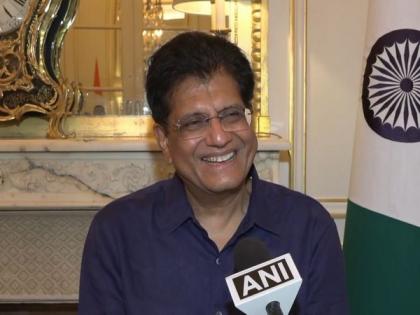India-US bilateral trade agreement negotiations resume in Delhi: Piyush Goyal
By ANI | Updated: June 5, 2025 23:18 IST2025-06-05T23:14:27+5:302025-06-05T23:18:21+5:30
Brescia [Italy], June 5 : The next round of negotiations for the India-United States Bilateral Trade Agreement commenced in ...

India-US bilateral trade agreement negotiations resume in Delhi: Piyush Goyal
Brescia [Italy], June 5 : The next round of negotiations for the India-United States Bilateral Trade Agreement commenced in Delhi, with US trade team officials in the capital engaging in crucial discussions aimed at strengthening economic ties between the two nations.
In an exclusive interview with ANI, Commerce and Industry Minister Piyush Goyal confirmed that US trade team officials have reached India, with additional team members expected to arrive soon to participate in the negotiations.
The talks come against the backdrop of recent statements by Goyal in Paris on June 1, where he outlined that India and the United States are working toward providing preferential market access to their respective businesses. Teams from both nations are actively collaborating on the proposed bilateral trade agreement framework.
When asked about US President Donald Trump's announcement to increase tariffs on steel and aluminium to 50 percent, Goyal indicated that both countries remain committed to addressing trade issues through bilateral dialogue.
"Let us wait and watch... both the US and India share good relations and we will continue to work together to resolve all these issues bilaterally," Goyal said.
The current negotiations build upon commitments made in February, when US President Donald Trump and Prime Minister Narendra Modi announced plans to negotiate the initial phase of a comprehensive, multi-sector Bilateral Trade Agreement. The timeline targets completion by fall 2025.
The proposed agreement is ambitious in scope, seeking to dramatically expand bilateral trade from the current $191 billion to $500 billion by 2030. This represents more than a doubling of trade volumes between the world's largest democracy and its most powerful economy.
The negotiations in Delhi mark a significant step forward in what both nations view as a strategic economic partnership, with potential implications for global trade patterns and supply chain configurations in key sectors including technology, pharmaceuticals, defence, and agriculture.
Disclaimer: This post has been auto-published from an agency feed without any modifications to the text and has not been reviewed by an editor
Open in app